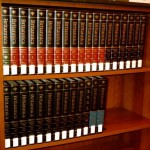
Traduzione by MARIA BONDANESE, volontaria di English Gratis. Il testo originale e l’immagine sono tratti da una pagina del sito inglese di Wikipedia e sono disponibili nel rispetto della licenza Creative Commons Attribution 2.5
PHOTO CREDIT
Encyclopædia Britannica (6)
L’Enciclopedia Britannica (6)
Vai alla puntata: 1•2•3•4•5•7•8•9•10•11•12•13•14•15•16
Critical and popular assessments
Giudizi popolari e di critica
Reputation
Reputazione
Since the 3rd edition, the Britannica has enjoyed a popular and critical reputation for general excellence.
A partire dalla terza edizione, la Britannica ha goduto di una buona reputazione da parte della critica e del pubblico per l’eccellenza generale.
Various editions from the 3rd to the 9th were pirated for sale in the United States, beginning with Dobson’s Encyclopædia.
Diverse edizioni, dalla terza alla nona, furono contraffatte per la vendita negli USA, cominciando dalla Dobson’s Encyclopædia.
>>>On the release of the 14th edition, Time magazine dubbed the Britannica the “Patriarch of the Library”.
Alla distribuzione della quattordicesima edizione, il magazine Time rinominò la Britannica la “Patriarca della Biblioteca”.
In a related advertisement, naturalist William Beebe was quoted as saying that the Britannica was “beyond comparison because there is no competitor.”
In una pubblicità correlata, il naturalista William Beebe fu citato per aver detto che la Britannica era “oltre ogni paragone perché non ci sono concorrenti”.
References to the Britannica can be found throughout English literature, most notably in one of Arthur Conan Doyle’s favourite Sherlock Holmes stories, “The Red-Headed League”.
Riferimenti alla Britannica possono essere trovati in tutta la letteratura inglese, in particolare in una delle storie favorite del Sherlock Holmes di Arthur Conan Doyle, “La Lega dei Capelli Rossi” (The Red-Headed League).
The tale was highlighted by the Lord Mayor of London, Gilbert Inglefield, at the bicentennial of the Britannica.
La storia fu messa in evidenza dal Sindaco di Londra, Gilbert Inglefield, al bicentenario della Britannica.
The Britannica has a popular reputation for summarising all of human knowledge.
La Britannica gode di una celebre reputazione per aver riassunto tutta la conoscenza umana.
To further their education, many have devoted themselves to reading the entire Britannica, taking anywhere from three to 22 years to do so.
Per arricchire la propria cultura, molti si sono dedicati alla lettura dell’intera Britannica, investendo nell’impresa un lasso di tempo che va dai tre ai ventidue anni.
When Fat’h Ali became the Shah of Persia in 1797, he was given a complete set of the Britannica’s 3rd edition, which he read completely; after this feat, he extended his royal title to include “Most Formidable Lord and Master of the Encyclopædia Britannica.”
Quando nel 1797 Fat’h Ali divenne lo Scià di Persia, gli fu donata l’intera terza edizione della Britannica che egli lesse interamente; dopo quest’impresa, egli estese il suo titolo reale diventando “Il più formidabile Signore e Padrone dell’Enciclopedia Britannica”.
Writer George Bernard Shaw claimed to have read the complete 9th edition—except for the science articles[4]—and Richard Evelyn Byrd took the Britannica as reading material for his five-month stay at the South Pole in 1934, while Philip Beaver read it during a sailing expedition.
Lo scrittore George Bernard Shaw sostenne di aver letto tutta la nona edizione – eccetto gli articoli scientifici – e Richard Evelyn Byrd usò la Britannica come materiale di lettura per il suo soggiorno di cinque mesi al Polo Sud nel 1934, mentre Philip Beaver la lesse durante una traversata.
More recently, A.J. Jacobs, an editor at Esquire magazine, read the entire 2002 version of the 15th edition, describing his experiences in the well-received 2004 book, The Know-It-All: One Man’s Humble Quest to Become the Smartest Person in the World.
Più recentemente, A.J. Jacobs, un redattore della rivista Esquire, lesse tutta la versione del 2002 della quindicesima edizione descrivendo le sue esperienze nel ben accolto libro del 2004, The Know-It-All: One Man’s Humble Quest to Become the Smartest Person in the World.
Only two people are known to have read two independent editions: the author C. S. Forester[4] and Amos Urban Shirk, an American businessman, who read the 11th and 14th editions, devoting roughly three hours per night for four and a half years to read the 11th.
Solo due persone sono note per aver letto due edizioni distinte: l’autore C. S. Forester e Amos Urban Shirk, un imprenditore americano, che lessero l’undicesima e la quattordicesima edizione, dedicando alla lettura dell’undicesima tre ore per notte per quattro anni e mezzo.
Several editors-in-chief of the Britannica are likely to have read their editions completely, such as William Smellie (1st edition), William Robertson Smith (9th edition), and Walter Yust (14th edition).
È probabile che numerosi redattori capo della Britannica abbiano letto le loro edizioni per intero, come William Smellie (prima edizione), William Robertson Smith (nona edizione), e Walter Yust (quattordicesima edizione).
(continua

